Entrepreneurship and Small Business Management: Ventures and Economy
VerifiedAdded on 2020/02/17
|18
|6297
|98
Essay
AI Summary
This essay provides a comprehensive overview of entrepreneurship and small business management, beginning with a definition of an entrepreneur and the factors influencing entrepreneurial success. It examines different types of entrepreneurial ventures, including lifestyle, serial, social, and techno entrepreneurs, highlighting their similarities and differences. The essay assesses the impact of micro and small businesses on the economy, emphasizing their role in job creation, GDP growth, and inflation mitigation. It also discusses the contribution of small firms to producing intermediate goods and providing opportunities for individuals seeking startup ventures. The document is available on Desklib, a platform offering study tools for students.

Assignment Name: Entrepreneurship and Small Business
Management
Student Name:
Student ID:
Professor Name:
Management
Student Name:
Student ID:
Professor Name:
Paraphrase This Document
Need a fresh take? Get an instant paraphrase of this document with our AI Paraphraser

Table of Contents
2
2
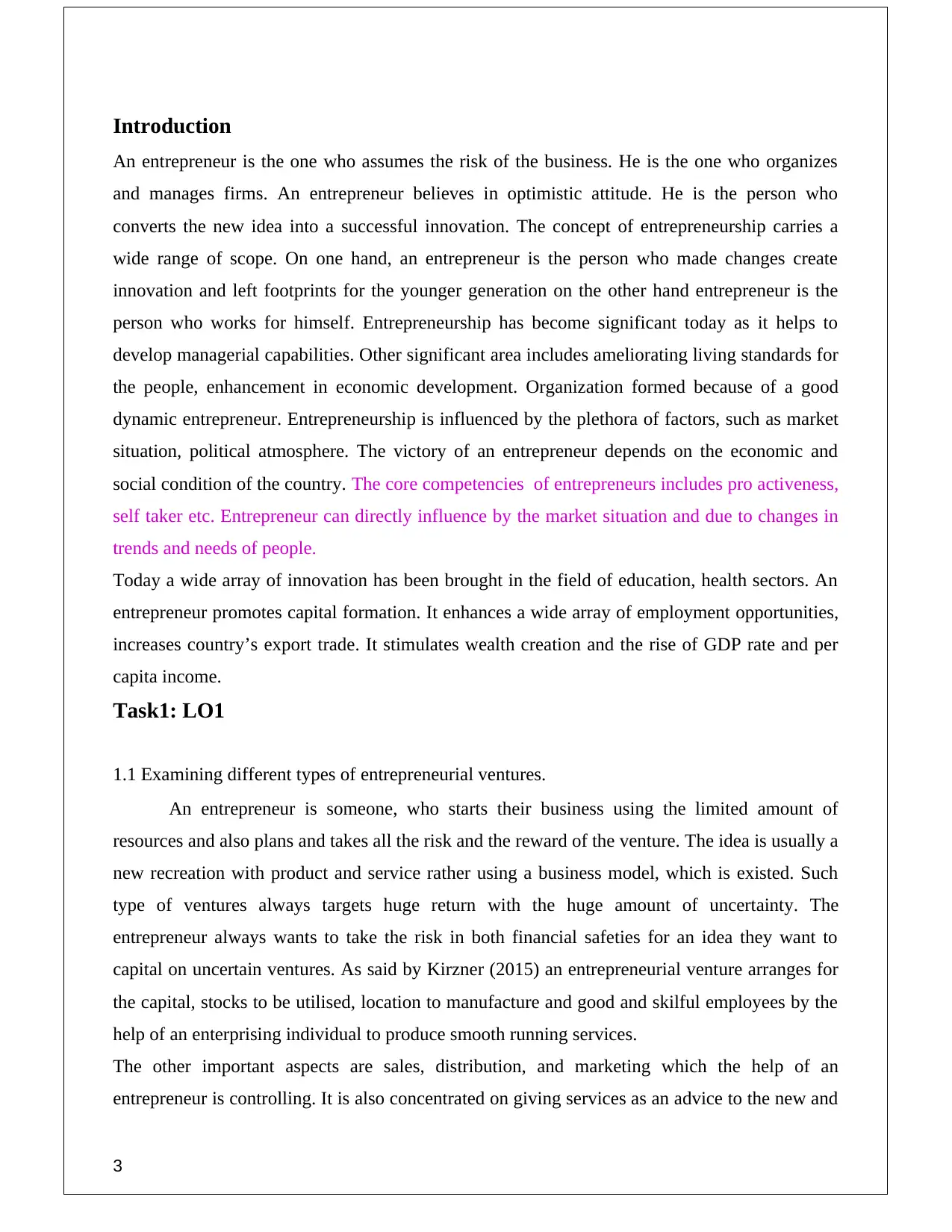
Introduction
An entrepreneur is the one who assumes the risk of the business. He is the one who organizes
and manages firms. An entrepreneur believes in optimistic attitude. He is the person who
converts the new idea into a successful innovation. The concept of entrepreneurship carries a
wide range of scope. On one hand, an entrepreneur is the person who made changes create
innovation and left footprints for the younger generation on the other hand entrepreneur is the
person who works for himself. Entrepreneurship has become significant today as it helps to
develop managerial capabilities. Other significant area includes ameliorating living standards for
the people, enhancement in economic development. Organization formed because of a good
dynamic entrepreneur. Entrepreneurship is influenced by the plethora of factors, such as market
situation, political atmosphere. The victory of an entrepreneur depends on the economic and
social condition of the country. The core competencies of entrepreneurs includes pro activeness,
self taker etc. Entrepreneur can directly influence by the market situation and due to changes in
trends and needs of people.
Today a wide array of innovation has been brought in the field of education, health sectors. An
entrepreneur promotes capital formation. It enhances a wide array of employment opportunities,
increases country’s export trade. It stimulates wealth creation and the rise of GDP rate and per
capita income.
Task1: LO1
1.1 Examining different types of entrepreneurial ventures.
An entrepreneur is someone, who starts their business using the limited amount of
resources and also plans and takes all the risk and the reward of the venture. The idea is usually a
new recreation with product and service rather using a business model, which is existed. Such
type of ventures always targets huge return with the huge amount of uncertainty. The
entrepreneur always wants to take the risk in both financial safeties for an idea they want to
capital on uncertain ventures. As said by Kirzner (2015) an entrepreneurial venture arranges for
the capital, stocks to be utilised, location to manufacture and good and skilful employees by the
help of an enterprising individual to produce smooth running services.
The other important aspects are sales, distribution, and marketing which the help of an
entrepreneur is controlling. It is also concentrated on giving services as an advice to the new and
3
An entrepreneur is the one who assumes the risk of the business. He is the one who organizes
and manages firms. An entrepreneur believes in optimistic attitude. He is the person who
converts the new idea into a successful innovation. The concept of entrepreneurship carries a
wide range of scope. On one hand, an entrepreneur is the person who made changes create
innovation and left footprints for the younger generation on the other hand entrepreneur is the
person who works for himself. Entrepreneurship has become significant today as it helps to
develop managerial capabilities. Other significant area includes ameliorating living standards for
the people, enhancement in economic development. Organization formed because of a good
dynamic entrepreneur. Entrepreneurship is influenced by the plethora of factors, such as market
situation, political atmosphere. The victory of an entrepreneur depends on the economic and
social condition of the country. The core competencies of entrepreneurs includes pro activeness,
self taker etc. Entrepreneur can directly influence by the market situation and due to changes in
trends and needs of people.
Today a wide array of innovation has been brought in the field of education, health sectors. An
entrepreneur promotes capital formation. It enhances a wide array of employment opportunities,
increases country’s export trade. It stimulates wealth creation and the rise of GDP rate and per
capita income.
Task1: LO1
1.1 Examining different types of entrepreneurial ventures.
An entrepreneur is someone, who starts their business using the limited amount of
resources and also plans and takes all the risk and the reward of the venture. The idea is usually a
new recreation with product and service rather using a business model, which is existed. Such
type of ventures always targets huge return with the huge amount of uncertainty. The
entrepreneur always wants to take the risk in both financial safeties for an idea they want to
capital on uncertain ventures. As said by Kirzner (2015) an entrepreneurial venture arranges for
the capital, stocks to be utilised, location to manufacture and good and skilful employees by the
help of an enterprising individual to produce smooth running services.
The other important aspects are sales, distribution, and marketing which the help of an
entrepreneur is controlling. It is also concentrated on giving services as an advice to the new and
3
⊘ This is a preview!⊘
Do you want full access?
Subscribe today to unlock all pages.

Trusted by 1+ million students worldwide
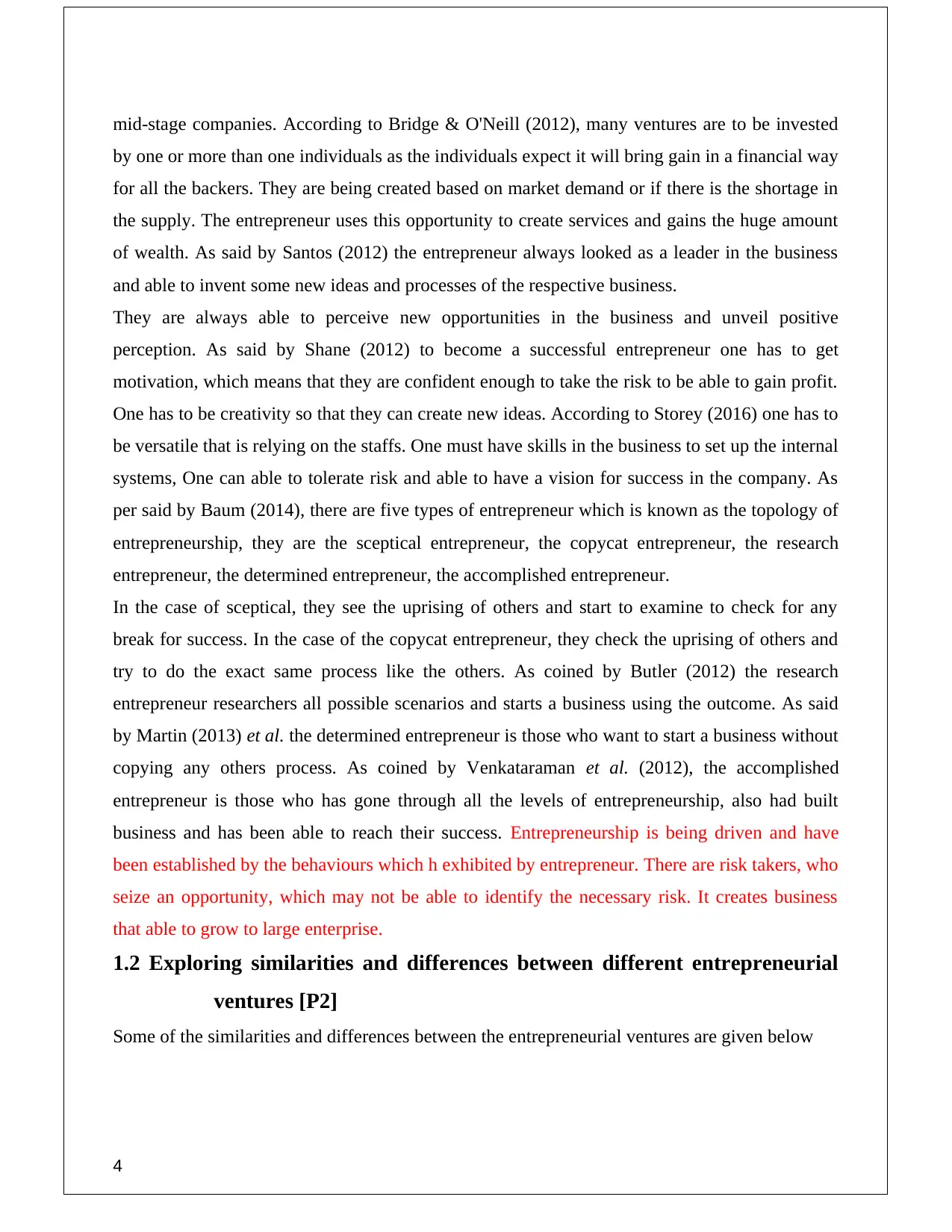
mid-stage companies. According to Bridge & O'Neill (2012), many ventures are to be invested
by one or more than one individuals as the individuals expect it will bring gain in a financial way
for all the backers. They are being created based on market demand or if there is the shortage in
the supply. The entrepreneur uses this opportunity to create services and gains the huge amount
of wealth. As said by Santos (2012) the entrepreneur always looked as a leader in the business
and able to invent some new ideas and processes of the respective business.
They are always able to perceive new opportunities in the business and unveil positive
perception. As said by Shane (2012) to become a successful entrepreneur one has to get
motivation, which means that they are confident enough to take the risk to be able to gain profit.
One has to be creativity so that they can create new ideas. According to Storey (2016) one has to
be versatile that is relying on the staffs. One must have skills in the business to set up the internal
systems, One can able to tolerate risk and able to have a vision for success in the company. As
per said by Baum (2014), there are five types of entrepreneur which is known as the topology of
entrepreneurship, they are the sceptical entrepreneur, the copycat entrepreneur, the research
entrepreneur, the determined entrepreneur, the accomplished entrepreneur.
In the case of sceptical, they see the uprising of others and start to examine to check for any
break for success. In the case of the copycat entrepreneur, they check the uprising of others and
try to do the exact same process like the others. As coined by Butler (2012) the research
entrepreneur researchers all possible scenarios and starts a business using the outcome. As said
by Martin (2013) et al. the determined entrepreneur is those who want to start a business without
copying any others process. As coined by Venkataraman et al. (2012), the accomplished
entrepreneur is those who has gone through all the levels of entrepreneurship, also had built
business and has been able to reach their success. Entrepreneurship is being driven and have
been established by the behaviours which h exhibited by entrepreneur. There are risk takers, who
seize an opportunity, which may not be able to identify the necessary risk. It creates business
that able to grow to large enterprise.
1.2 Exploring similarities and differences between different entrepreneurial
ventures [P2]
Some of the similarities and differences between the entrepreneurial ventures are given below
4
by one or more than one individuals as the individuals expect it will bring gain in a financial way
for all the backers. They are being created based on market demand or if there is the shortage in
the supply. The entrepreneur uses this opportunity to create services and gains the huge amount
of wealth. As said by Santos (2012) the entrepreneur always looked as a leader in the business
and able to invent some new ideas and processes of the respective business.
They are always able to perceive new opportunities in the business and unveil positive
perception. As said by Shane (2012) to become a successful entrepreneur one has to get
motivation, which means that they are confident enough to take the risk to be able to gain profit.
One has to be creativity so that they can create new ideas. According to Storey (2016) one has to
be versatile that is relying on the staffs. One must have skills in the business to set up the internal
systems, One can able to tolerate risk and able to have a vision for success in the company. As
per said by Baum (2014), there are five types of entrepreneur which is known as the topology of
entrepreneurship, they are the sceptical entrepreneur, the copycat entrepreneur, the research
entrepreneur, the determined entrepreneur, the accomplished entrepreneur.
In the case of sceptical, they see the uprising of others and start to examine to check for any
break for success. In the case of the copycat entrepreneur, they check the uprising of others and
try to do the exact same process like the others. As coined by Butler (2012) the research
entrepreneur researchers all possible scenarios and starts a business using the outcome. As said
by Martin (2013) et al. the determined entrepreneur is those who want to start a business without
copying any others process. As coined by Venkataraman et al. (2012), the accomplished
entrepreneur is those who has gone through all the levels of entrepreneurship, also had built
business and has been able to reach their success. Entrepreneurship is being driven and have
been established by the behaviours which h exhibited by entrepreneur. There are risk takers, who
seize an opportunity, which may not be able to identify the necessary risk. It creates business
that able to grow to large enterprise.
1.2 Exploring similarities and differences between different entrepreneurial
ventures [P2]
Some of the similarities and differences between the entrepreneurial ventures are given below
4
Paraphrase This Document
Need a fresh take? Get an instant paraphrase of this document with our AI Paraphraser
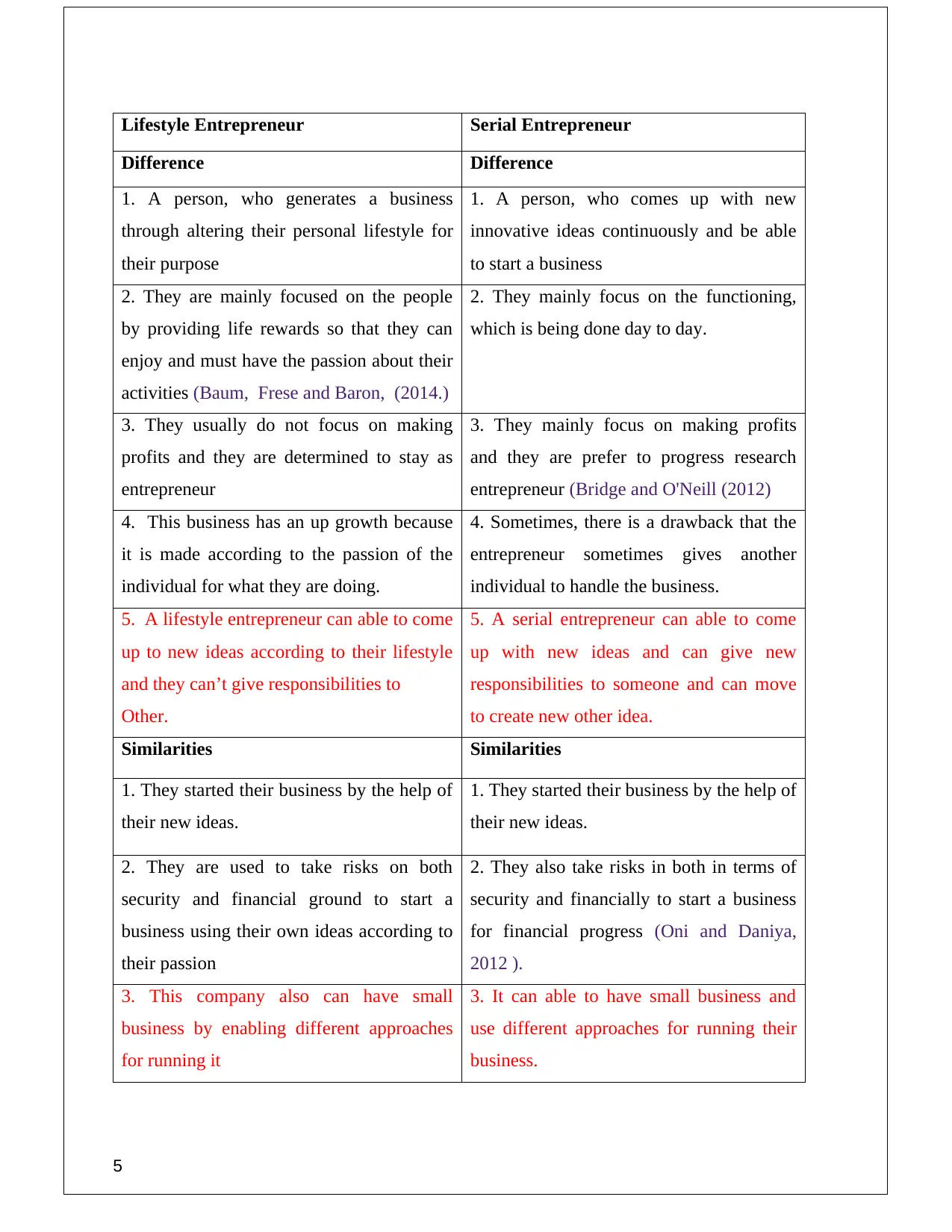
Lifestyle Entrepreneur Serial Entrepreneur
Difference Difference
1. A person, who generates a business
through altering their personal lifestyle for
their purpose
1. A person, who comes up with new
innovative ideas continuously and be able
to start a business
2. They are mainly focused on the people
by providing life rewards so that they can
enjoy and must have the passion about their
activities (Baum, Frese and Baron, (2014.)
2. They mainly focus on the functioning,
which is being done day to day.
3. They usually do not focus on making
profits and they are determined to stay as
entrepreneur
3. They mainly focus on making profits
and they are prefer to progress research
entrepreneur (Bridge and O'Neill (2012)
4. This business has an up growth because
it is made according to the passion of the
individual for what they are doing.
4. Sometimes, there is a drawback that the
entrepreneur sometimes gives another
individual to handle the business.
5. A lifestyle entrepreneur can able to come
up to new ideas according to their lifestyle
and they can’t give responsibilities to
Other.
5. A serial entrepreneur can able to come
up with new ideas and can give new
responsibilities to someone and can move
to create new other idea.
Similarities Similarities
1. They started their business by the help of
their new ideas.
1. They started their business by the help of
their new ideas.
2. They are used to take risks on both
security and financial ground to start a
business using their own ideas according to
their passion
2. They also take risks in both in terms of
security and financially to start a business
for financial progress (Oni and Daniya,
2012 ).
3. This company also can have small
business by enabling different approaches
for running it
3. It can able to have small business and
use different approaches for running their
business.
5
Difference Difference
1. A person, who generates a business
through altering their personal lifestyle for
their purpose
1. A person, who comes up with new
innovative ideas continuously and be able
to start a business
2. They are mainly focused on the people
by providing life rewards so that they can
enjoy and must have the passion about their
activities (Baum, Frese and Baron, (2014.)
2. They mainly focus on the functioning,
which is being done day to day.
3. They usually do not focus on making
profits and they are determined to stay as
entrepreneur
3. They mainly focus on making profits
and they are prefer to progress research
entrepreneur (Bridge and O'Neill (2012)
4. This business has an up growth because
it is made according to the passion of the
individual for what they are doing.
4. Sometimes, there is a drawback that the
entrepreneur sometimes gives another
individual to handle the business.
5. A lifestyle entrepreneur can able to come
up to new ideas according to their lifestyle
and they can’t give responsibilities to
Other.
5. A serial entrepreneur can able to come
up with new ideas and can give new
responsibilities to someone and can move
to create new other idea.
Similarities Similarities
1. They started their business by the help of
their new ideas.
1. They started their business by the help of
their new ideas.
2. They are used to take risks on both
security and financial ground to start a
business using their own ideas according to
their passion
2. They also take risks in both in terms of
security and financially to start a business
for financial progress (Oni and Daniya,
2012 ).
3. This company also can have small
business by enabling different approaches
for running it
3. It can able to have small business and
use different approaches for running their
business.
5
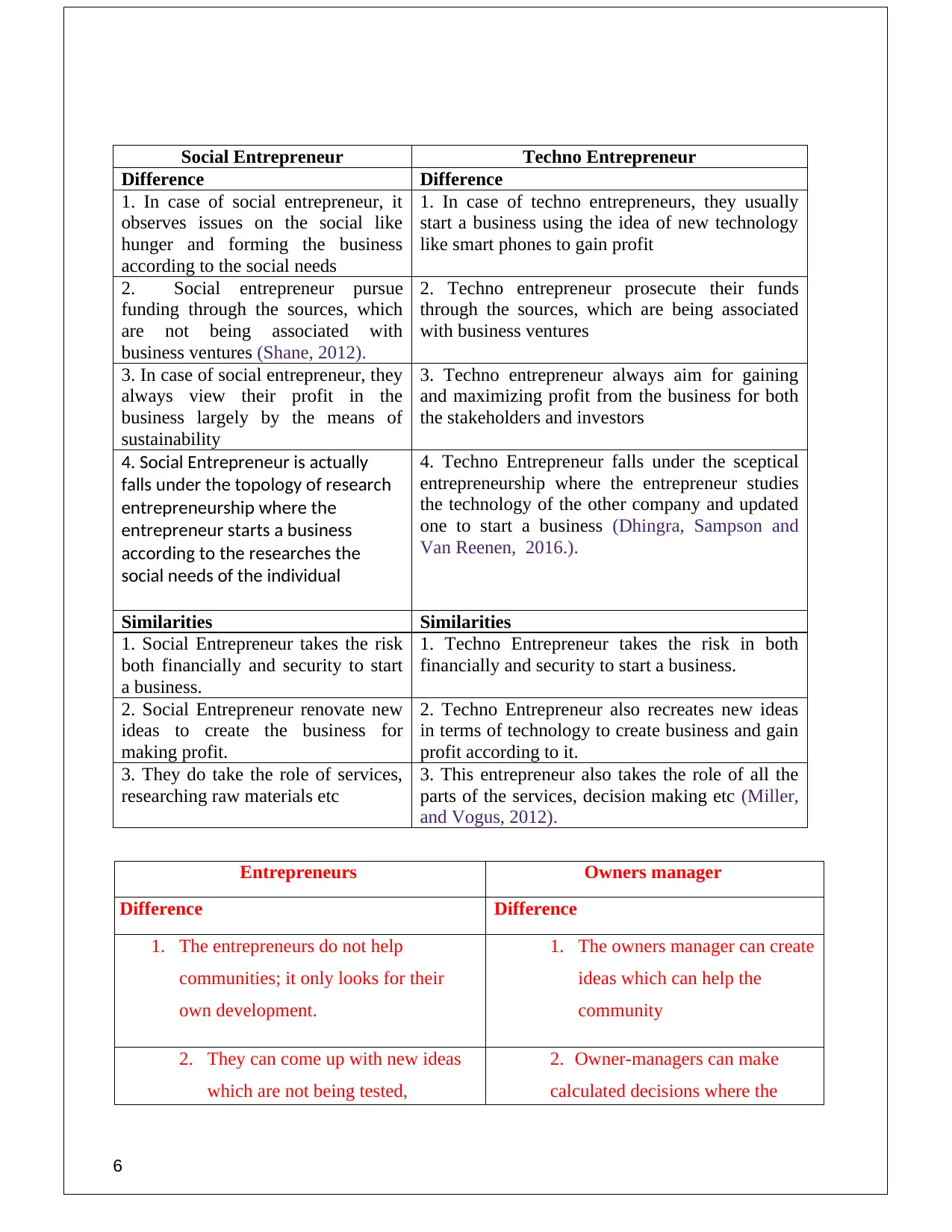
Social Entrepreneur Techno Entrepreneur
Difference Difference
1. In case of social entrepreneur, it
observes issues on the social like
hunger and forming the business
according to the social needs
1. In case of techno entrepreneurs, they usually
start a business using the idea of new technology
like smart phones to gain profit
2. Social entrepreneur pursue
funding through the sources, which
are not being associated with
business ventures (Shane, 2012).
2. Techno entrepreneur prosecute their funds
through the sources, which are being associated
with business ventures
3. In case of social entrepreneur, they
always view their profit in the
business largely by the means of
sustainability
3. Techno entrepreneur always aim for gaining
and maximizing profit from the business for both
the stakeholders and investors
4. Social Entrepreneur is actually
falls under the topology of research
entrepreneurship where the
entrepreneur starts a business
according to the researches the
social needs of the individual
4. Techno Entrepreneur falls under the sceptical
entrepreneurship where the entrepreneur studies
the technology of the other company and updated
one to start a business (Dhingra, Sampson and
Van Reenen, 2016.).
Similarities Similarities
1. Social Entrepreneur takes the risk
both financially and security to start
a business.
1. Techno Entrepreneur takes the risk in both
financially and security to start a business.
2. Social Entrepreneur renovate new
ideas to create the business for
making profit.
2. Techno Entrepreneur also recreates new ideas
in terms of technology to create business and gain
profit according to it.
3. They do take the role of services,
researching raw materials etc
3. This entrepreneur also takes the role of all the
parts of the services, decision making etc (Miller,
and Vogus, 2012).
Entrepreneurs Owners manager
Difference Difference
1. The entrepreneurs do not help
communities; it only looks for their
own development.
1. The owners manager can create
ideas which can help the
community
2. They can come up with new ideas
which are not being tested,
2. Owner-managers can make
calculated decisions where the
6
Difference Difference
1. In case of social entrepreneur, it
observes issues on the social like
hunger and forming the business
according to the social needs
1. In case of techno entrepreneurs, they usually
start a business using the idea of new technology
like smart phones to gain profit
2. Social entrepreneur pursue
funding through the sources, which
are not being associated with
business ventures (Shane, 2012).
2. Techno entrepreneur prosecute their funds
through the sources, which are being associated
with business ventures
3. In case of social entrepreneur, they
always view their profit in the
business largely by the means of
sustainability
3. Techno entrepreneur always aim for gaining
and maximizing profit from the business for both
the stakeholders and investors
4. Social Entrepreneur is actually
falls under the topology of research
entrepreneurship where the
entrepreneur starts a business
according to the researches the
social needs of the individual
4. Techno Entrepreneur falls under the sceptical
entrepreneurship where the entrepreneur studies
the technology of the other company and updated
one to start a business (Dhingra, Sampson and
Van Reenen, 2016.).
Similarities Similarities
1. Social Entrepreneur takes the risk
both financially and security to start
a business.
1. Techno Entrepreneur takes the risk in both
financially and security to start a business.
2. Social Entrepreneur renovate new
ideas to create the business for
making profit.
2. Techno Entrepreneur also recreates new ideas
in terms of technology to create business and gain
profit according to it.
3. They do take the role of services,
researching raw materials etc
3. This entrepreneur also takes the role of all the
parts of the services, decision making etc (Miller,
and Vogus, 2012).
Entrepreneurs Owners manager
Difference Difference
1. The entrepreneurs do not help
communities; it only looks for their
own development.
1. The owners manager can create
ideas which can help the
community
2. They can come up with new ideas
which are not being tested,
2. Owner-managers can make
calculated decisions where the
6
⊘ This is a preview!⊘
Do you want full access?
Subscribe today to unlock all pages.

Trusted by 1+ million students worldwide
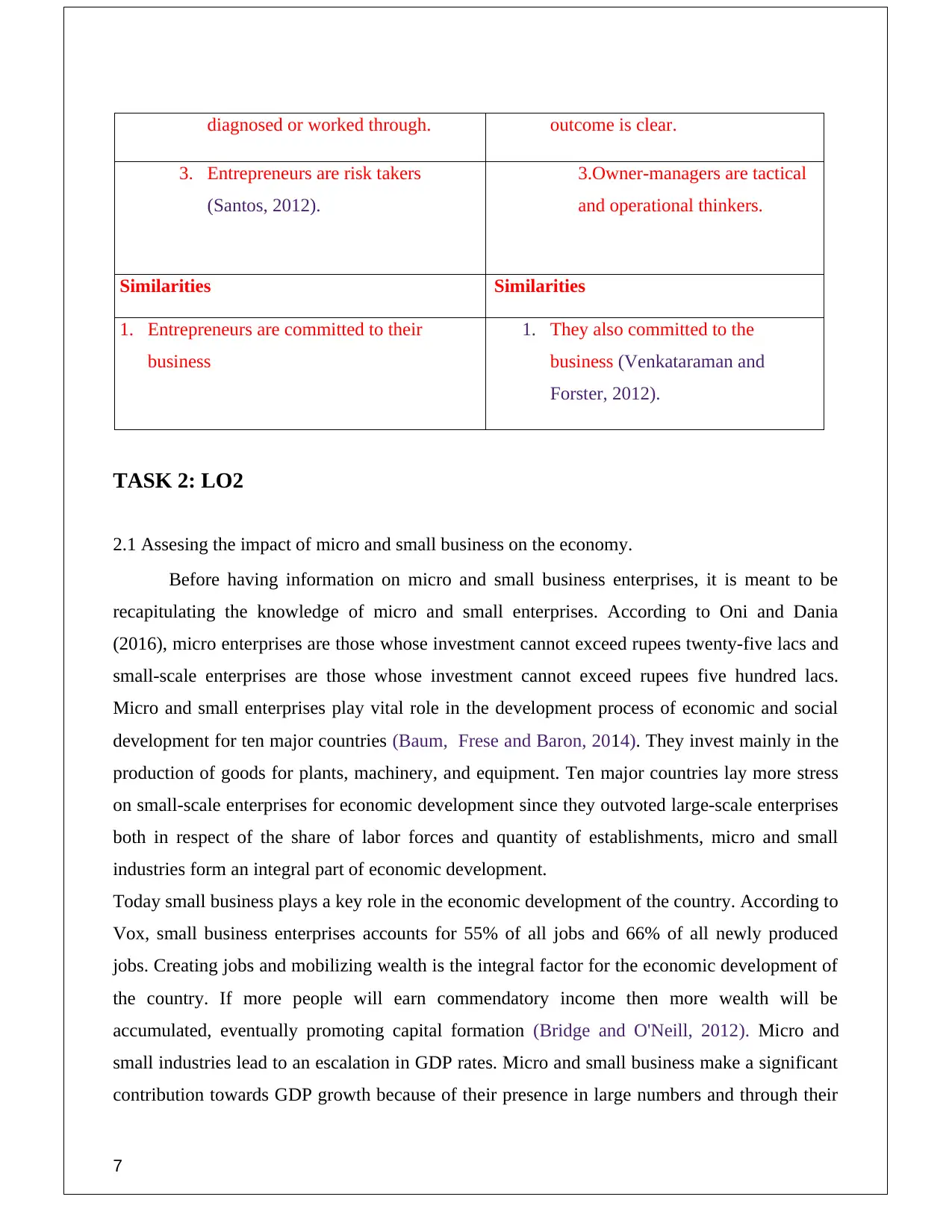
diagnosed or worked through. outcome is clear.
3. Entrepreneurs are risk takers
(Santos, 2012).
3.Owner-managers are tactical
and operational thinkers.
Similarities Similarities
1. Entrepreneurs are committed to their
business
1. They also committed to the
business (Venkataraman and
Forster, 2012).
TASK 2: LO2
2.1 Assesing the impact of micro and small business on the economy.
Before having information on micro and small business enterprises, it is meant to be
recapitulating the knowledge of micro and small enterprises. According to Oni and Dania
(2016), micro enterprises are those whose investment cannot exceed rupees twenty-five lacs and
small-scale enterprises are those whose investment cannot exceed rupees five hundred lacs.
Micro and small enterprises play vital role in the development process of economic and social
development for ten major countries (Baum, Frese and Baron, 2014). They invest mainly in the
production of goods for plants, machinery, and equipment. Ten major countries lay more stress
on small-scale enterprises for economic development since they outvoted large-scale enterprises
both in respect of the share of labor forces and quantity of establishments, micro and small
industries form an integral part of economic development.
Today small business plays a key role in the economic development of the country. According to
Vox, small business enterprises accounts for 55% of all jobs and 66% of all newly produced
jobs. Creating jobs and mobilizing wealth is the integral factor for the economic development of
the country. If more people will earn commendatory income then more wealth will be
accumulated, eventually promoting capital formation (Bridge and O'Neill, 2012). Micro and
small industries lead to an escalation in GDP rates. Micro and small business make a significant
contribution towards GDP growth because of their presence in large numbers and through their
7
3. Entrepreneurs are risk takers
(Santos, 2012).
3.Owner-managers are tactical
and operational thinkers.
Similarities Similarities
1. Entrepreneurs are committed to their
business
1. They also committed to the
business (Venkataraman and
Forster, 2012).
TASK 2: LO2
2.1 Assesing the impact of micro and small business on the economy.
Before having information on micro and small business enterprises, it is meant to be
recapitulating the knowledge of micro and small enterprises. According to Oni and Dania
(2016), micro enterprises are those whose investment cannot exceed rupees twenty-five lacs and
small-scale enterprises are those whose investment cannot exceed rupees five hundred lacs.
Micro and small enterprises play vital role in the development process of economic and social
development for ten major countries (Baum, Frese and Baron, 2014). They invest mainly in the
production of goods for plants, machinery, and equipment. Ten major countries lay more stress
on small-scale enterprises for economic development since they outvoted large-scale enterprises
both in respect of the share of labor forces and quantity of establishments, micro and small
industries form an integral part of economic development.
Today small business plays a key role in the economic development of the country. According to
Vox, small business enterprises accounts for 55% of all jobs and 66% of all newly produced
jobs. Creating jobs and mobilizing wealth is the integral factor for the economic development of
the country. If more people will earn commendatory income then more wealth will be
accumulated, eventually promoting capital formation (Bridge and O'Neill, 2012). Micro and
small industries lead to an escalation in GDP rates. Micro and small business make a significant
contribution towards GDP growth because of their presence in large numbers and through their
7
Paraphrase This Document
Need a fresh take? Get an instant paraphrase of this document with our AI Paraphraser
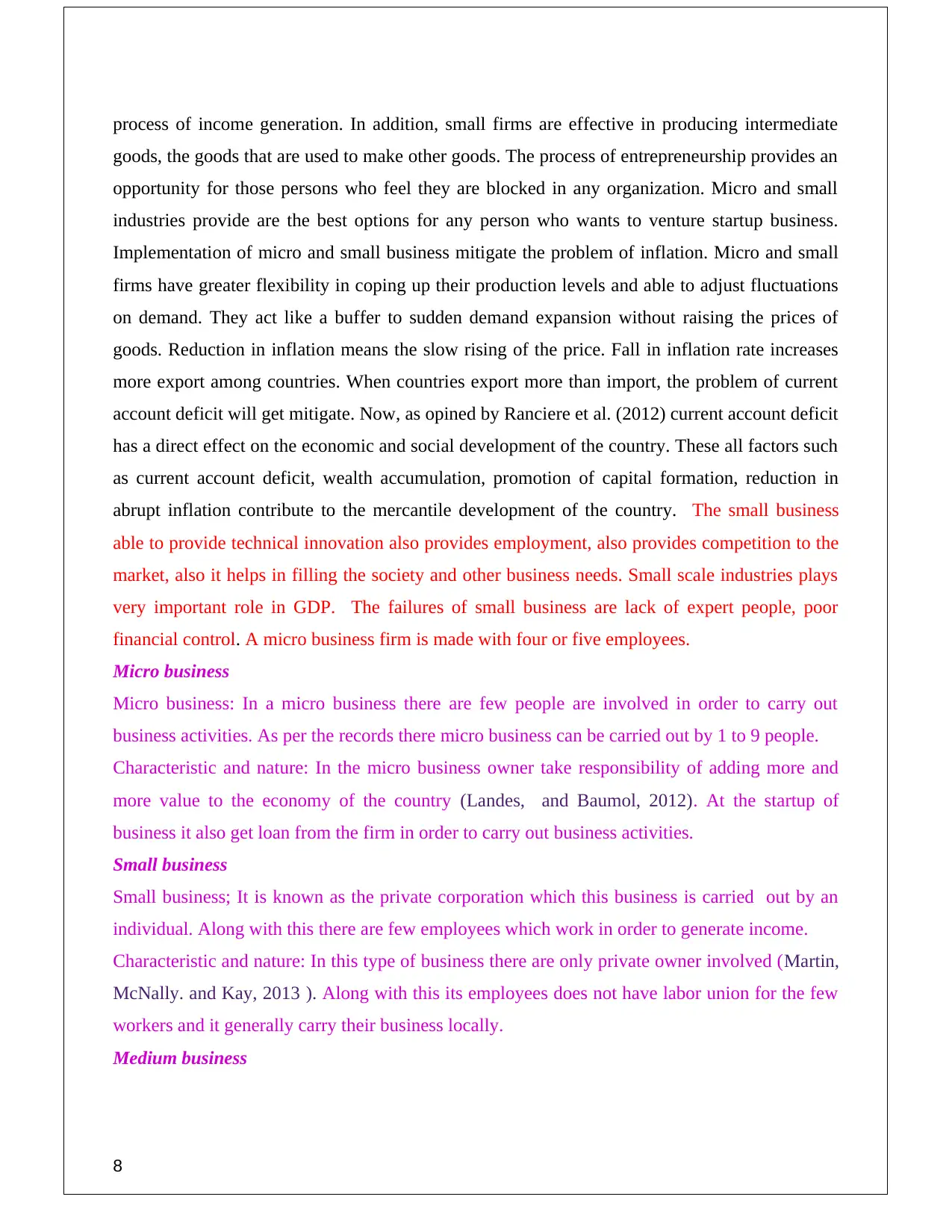
process of income generation. In addition, small firms are effective in producing intermediate
goods, the goods that are used to make other goods. The process of entrepreneurship provides an
opportunity for those persons who feel they are blocked in any organization. Micro and small
industries provide are the best options for any person who wants to venture startup business.
Implementation of micro and small business mitigate the problem of inflation. Micro and small
firms have greater flexibility in coping up their production levels and able to adjust fluctuations
on demand. They act like a buffer to sudden demand expansion without raising the prices of
goods. Reduction in inflation means the slow rising of the price. Fall in inflation rate increases
more export among countries. When countries export more than import, the problem of current
account deficit will get mitigate. Now, as opined by Ranciere et al. (2012) current account deficit
has a direct effect on the economic and social development of the country. These all factors such
as current account deficit, wealth accumulation, promotion of capital formation, reduction in
abrupt inflation contribute to the mercantile development of the country. The small business
able to provide technical innovation also provides employment, also provides competition to the
market, also it helps in filling the society and other business needs. Small scale industries plays
very important role in GDP. The failures of small business are lack of expert people, poor
financial control. A micro business firm is made with four or five employees.
Micro business
Micro business: In a micro business there are few people are involved in order to carry out
business activities. As per the records there micro business can be carried out by 1 to 9 people.
Characteristic and nature: In the micro business owner take responsibility of adding more and
more value to the economy of the country (Landes, and Baumol, 2012). At the startup of
business it also get loan from the firm in order to carry out business activities.
Small business
Small business; It is known as the private corporation which this business is carried out by an
individual. Along with this there are few employees which work in order to generate income.
Characteristic and nature: In this type of business there are only private owner involved (Martin,
McNally. and Kay, 2013 ). Along with this its employees does not have labor union for the few
workers and it generally carry their business locally.
Medium business
8
goods, the goods that are used to make other goods. The process of entrepreneurship provides an
opportunity for those persons who feel they are blocked in any organization. Micro and small
industries provide are the best options for any person who wants to venture startup business.
Implementation of micro and small business mitigate the problem of inflation. Micro and small
firms have greater flexibility in coping up their production levels and able to adjust fluctuations
on demand. They act like a buffer to sudden demand expansion without raising the prices of
goods. Reduction in inflation means the slow rising of the price. Fall in inflation rate increases
more export among countries. When countries export more than import, the problem of current
account deficit will get mitigate. Now, as opined by Ranciere et al. (2012) current account deficit
has a direct effect on the economic and social development of the country. These all factors such
as current account deficit, wealth accumulation, promotion of capital formation, reduction in
abrupt inflation contribute to the mercantile development of the country. The small business
able to provide technical innovation also provides employment, also provides competition to the
market, also it helps in filling the society and other business needs. Small scale industries plays
very important role in GDP. The failures of small business are lack of expert people, poor
financial control. A micro business firm is made with four or five employees.
Micro business
Micro business: In a micro business there are few people are involved in order to carry out
business activities. As per the records there micro business can be carried out by 1 to 9 people.
Characteristic and nature: In the micro business owner take responsibility of adding more and
more value to the economy of the country (Landes, and Baumol, 2012). At the startup of
business it also get loan from the firm in order to carry out business activities.
Small business
Small business; It is known as the private corporation which this business is carried out by an
individual. Along with this there are few employees which work in order to generate income.
Characteristic and nature: In this type of business there are only private owner involved (Martin,
McNally. and Kay, 2013 ). Along with this its employees does not have labor union for the few
workers and it generally carry their business locally.
Medium business
8
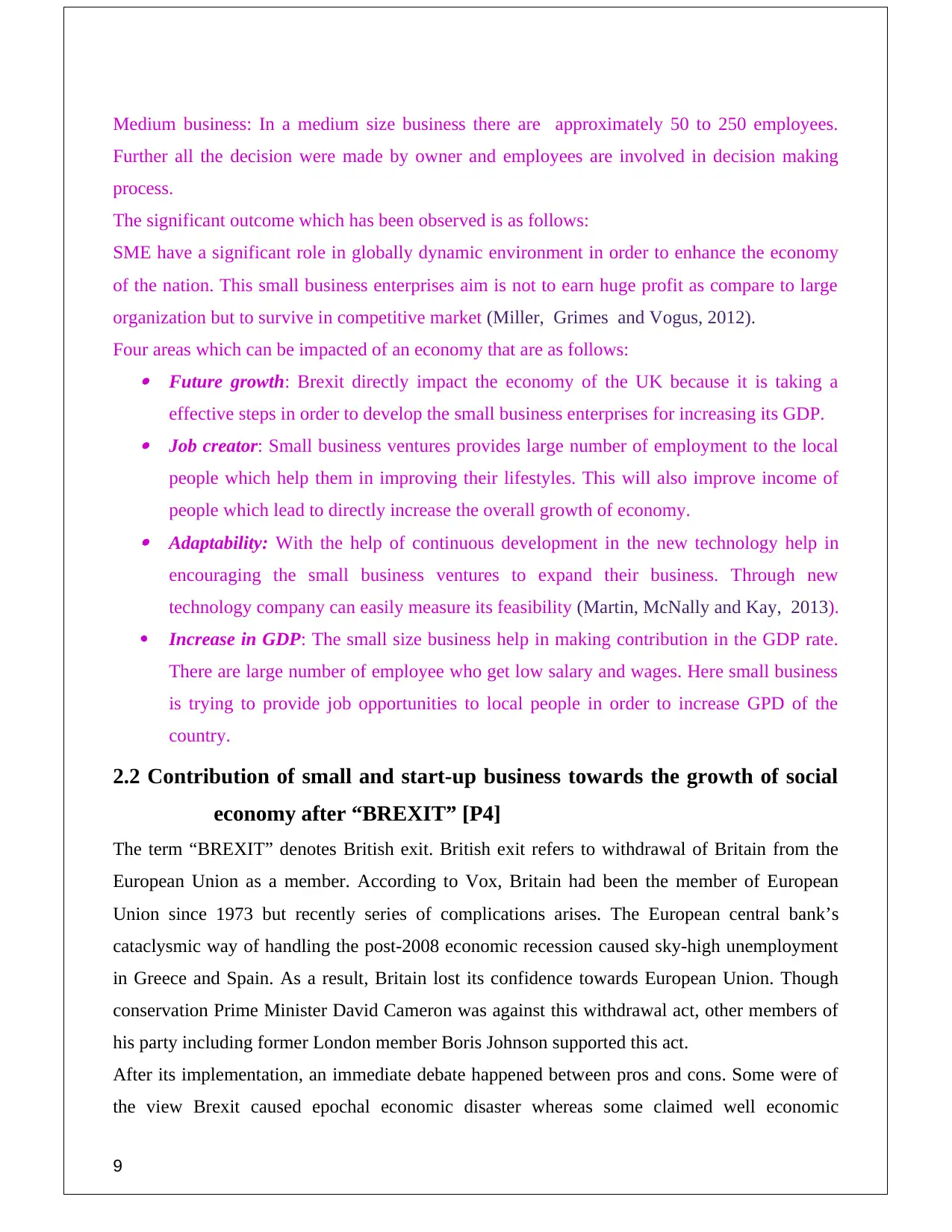
Medium business: In a medium size business there are approximately 50 to 250 employees.
Further all the decision were made by owner and employees are involved in decision making
process.
The significant outcome which has been observed is as follows:
SME have a significant role in globally dynamic environment in order to enhance the economy
of the nation. This small business enterprises aim is not to earn huge profit as compare to large
organization but to survive in competitive market (Miller, Grimes and Vogus, 2012).
Four areas which can be impacted of an economy that are as follows: Future growth: Brexit directly impact the economy of the UK because it is taking a
effective steps in order to develop the small business enterprises for increasing its GDP. Job creator: Small business ventures provides large number of employment to the local
people which help them in improving their lifestyles. This will also improve income of
people which lead to directly increase the overall growth of economy. Adaptability: With the help of continuous development in the new technology help in
encouraging the small business ventures to expand their business. Through new
technology company can easily measure its feasibility (Martin, McNally and Kay, 2013).
Increase in GDP: The small size business help in making contribution in the GDP rate.
There are large number of employee who get low salary and wages. Here small business
is trying to provide job opportunities to local people in order to increase GPD of the
country.
2.2 Contribution of small and start-up business towards the growth of social
economy after “BREXIT” [P4]
The term “BREXIT” denotes British exit. British exit refers to withdrawal of Britain from the
European Union as a member. According to Vox, Britain had been the member of European
Union since 1973 but recently series of complications arises. The European central bank’s
cataclysmic way of handling the post-2008 economic recession caused sky-high unemployment
in Greece and Spain. As a result, Britain lost its confidence towards European Union. Though
conservation Prime Minister David Cameron was against this withdrawal act, other members of
his party including former London member Boris Johnson supported this act.
After its implementation, an immediate debate happened between pros and cons. Some were of
the view Brexit caused epochal economic disaster whereas some claimed well economic
9
Further all the decision were made by owner and employees are involved in decision making
process.
The significant outcome which has been observed is as follows:
SME have a significant role in globally dynamic environment in order to enhance the economy
of the nation. This small business enterprises aim is not to earn huge profit as compare to large
organization but to survive in competitive market (Miller, Grimes and Vogus, 2012).
Four areas which can be impacted of an economy that are as follows: Future growth: Brexit directly impact the economy of the UK because it is taking a
effective steps in order to develop the small business enterprises for increasing its GDP. Job creator: Small business ventures provides large number of employment to the local
people which help them in improving their lifestyles. This will also improve income of
people which lead to directly increase the overall growth of economy. Adaptability: With the help of continuous development in the new technology help in
encouraging the small business ventures to expand their business. Through new
technology company can easily measure its feasibility (Martin, McNally and Kay, 2013).
Increase in GDP: The small size business help in making contribution in the GDP rate.
There are large number of employee who get low salary and wages. Here small business
is trying to provide job opportunities to local people in order to increase GPD of the
country.
2.2 Contribution of small and start-up business towards the growth of social
economy after “BREXIT” [P4]
The term “BREXIT” denotes British exit. British exit refers to withdrawal of Britain from the
European Union as a member. According to Vox, Britain had been the member of European
Union since 1973 but recently series of complications arises. The European central bank’s
cataclysmic way of handling the post-2008 economic recession caused sky-high unemployment
in Greece and Spain. As a result, Britain lost its confidence towards European Union. Though
conservation Prime Minister David Cameron was against this withdrawal act, other members of
his party including former London member Boris Johnson supported this act.
After its implementation, an immediate debate happened between pros and cons. Some were of
the view Brexit caused epochal economic disaster whereas some claimed well economic
9
⊘ This is a preview!⊘
Do you want full access?
Subscribe today to unlock all pages.

Trusted by 1+ million students worldwide
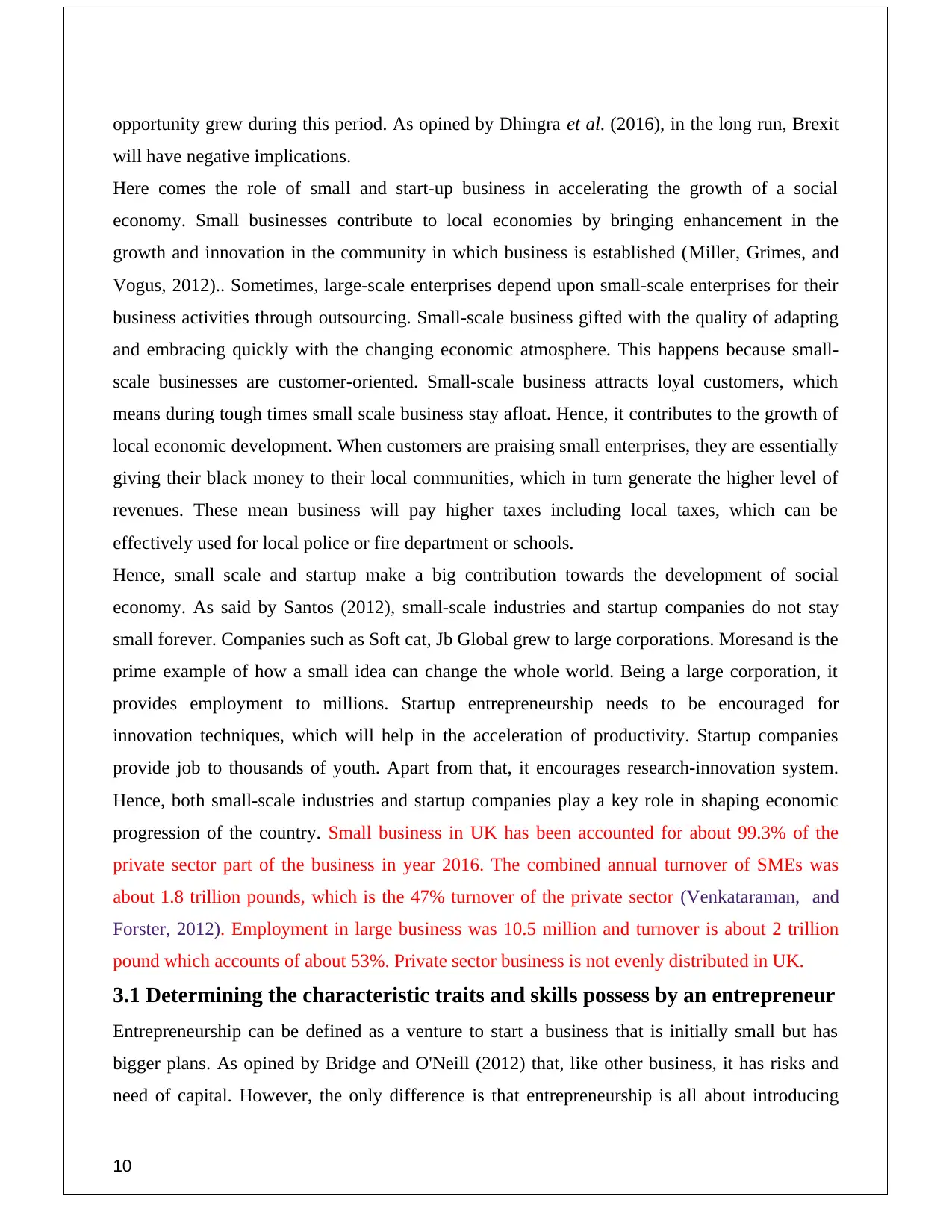
opportunity grew during this period. As opined by Dhingra et al. (2016), in the long run, Brexit
will have negative implications.
Here comes the role of small and start-up business in accelerating the growth of a social
economy. Small businesses contribute to local economies by bringing enhancement in the
growth and innovation in the community in which business is established (Miller, Grimes, and
Vogus, 2012).. Sometimes, large-scale enterprises depend upon small-scale enterprises for their
business activities through outsourcing. Small-scale business gifted with the quality of adapting
and embracing quickly with the changing economic atmosphere. This happens because small-
scale businesses are customer-oriented. Small-scale business attracts loyal customers, which
means during tough times small scale business stay afloat. Hence, it contributes to the growth of
local economic development. When customers are praising small enterprises, they are essentially
giving their black money to their local communities, which in turn generate the higher level of
revenues. These mean business will pay higher taxes including local taxes, which can be
effectively used for local police or fire department or schools.
Hence, small scale and startup make a big contribution towards the development of social
economy. As said by Santos (2012), small-scale industries and startup companies do not stay
small forever. Companies such as Soft cat, Jb Global grew to large corporations. Moresand is the
prime example of how a small idea can change the whole world. Being a large corporation, it
provides employment to millions. Startup entrepreneurship needs to be encouraged for
innovation techniques, which will help in the acceleration of productivity. Startup companies
provide job to thousands of youth. Apart from that, it encourages research-innovation system.
Hence, both small-scale industries and startup companies play a key role in shaping economic
progression of the country. Small business in UK has been accounted for about 99.3% of the
private sector part of the business in year 2016. The combined annual turnover of SMEs was
about 1.8 trillion pounds, which is the 47% turnover of the private sector (Venkataraman, and
Forster, 2012). Employment in large business was 10.5 million and turnover is about 2 trillion
pound which accounts of about 53%. Private sector business is not evenly distributed in UK.
3.1 Determining the characteristic traits and skills possess by an entrepreneur
Entrepreneurship can be defined as a venture to start a business that is initially small but has
bigger plans. As opined by Bridge and O'Neill (2012) that, like other business, it has risks and
need of capital. However, the only difference is that entrepreneurship is all about introducing
10
will have negative implications.
Here comes the role of small and start-up business in accelerating the growth of a social
economy. Small businesses contribute to local economies by bringing enhancement in the
growth and innovation in the community in which business is established (Miller, Grimes, and
Vogus, 2012).. Sometimes, large-scale enterprises depend upon small-scale enterprises for their
business activities through outsourcing. Small-scale business gifted with the quality of adapting
and embracing quickly with the changing economic atmosphere. This happens because small-
scale businesses are customer-oriented. Small-scale business attracts loyal customers, which
means during tough times small scale business stay afloat. Hence, it contributes to the growth of
local economic development. When customers are praising small enterprises, they are essentially
giving their black money to their local communities, which in turn generate the higher level of
revenues. These mean business will pay higher taxes including local taxes, which can be
effectively used for local police or fire department or schools.
Hence, small scale and startup make a big contribution towards the development of social
economy. As said by Santos (2012), small-scale industries and startup companies do not stay
small forever. Companies such as Soft cat, Jb Global grew to large corporations. Moresand is the
prime example of how a small idea can change the whole world. Being a large corporation, it
provides employment to millions. Startup entrepreneurship needs to be encouraged for
innovation techniques, which will help in the acceleration of productivity. Startup companies
provide job to thousands of youth. Apart from that, it encourages research-innovation system.
Hence, both small-scale industries and startup companies play a key role in shaping economic
progression of the country. Small business in UK has been accounted for about 99.3% of the
private sector part of the business in year 2016. The combined annual turnover of SMEs was
about 1.8 trillion pounds, which is the 47% turnover of the private sector (Venkataraman, and
Forster, 2012). Employment in large business was 10.5 million and turnover is about 2 trillion
pound which accounts of about 53%. Private sector business is not evenly distributed in UK.
3.1 Determining the characteristic traits and skills possess by an entrepreneur
Entrepreneurship can be defined as a venture to start a business that is initially small but has
bigger plans. As opined by Bridge and O'Neill (2012) that, like other business, it has risks and
need of capital. However, the only difference is that entrepreneurship is all about introducing
10
Paraphrase This Document
Need a fresh take? Get an instant paraphrase of this document with our AI Paraphraser
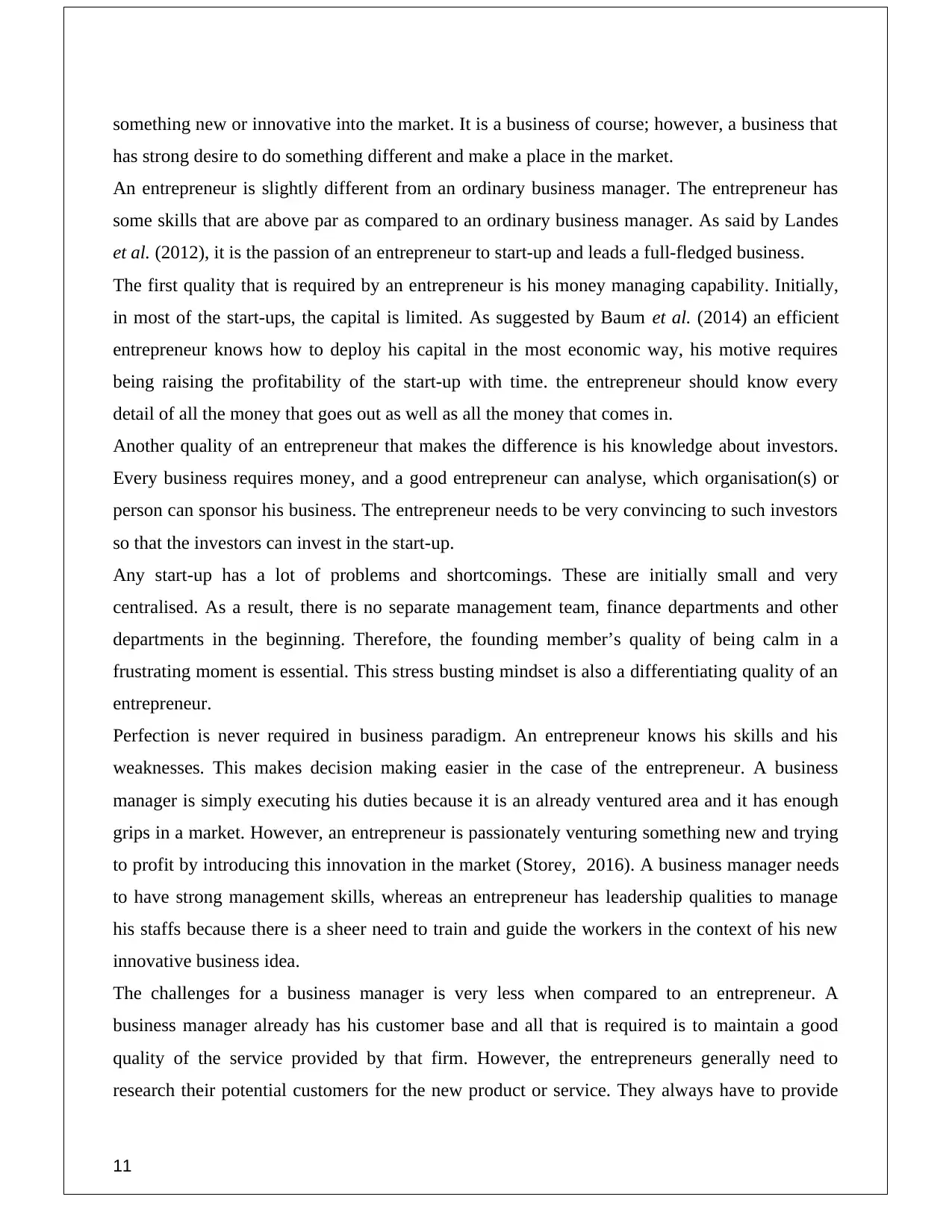
something new or innovative into the market. It is a business of course; however, a business that
has strong desire to do something different and make a place in the market.
An entrepreneur is slightly different from an ordinary business manager. The entrepreneur has
some skills that are above par as compared to an ordinary business manager. As said by Landes
et al. (2012), it is the passion of an entrepreneur to start-up and leads a full-fledged business.
The first quality that is required by an entrepreneur is his money managing capability. Initially,
in most of the start-ups, the capital is limited. As suggested by Baum et al. (2014) an efficient
entrepreneur knows how to deploy his capital in the most economic way, his motive requires
being raising the profitability of the start-up with time. the entrepreneur should know every
detail of all the money that goes out as well as all the money that comes in.
Another quality of an entrepreneur that makes the difference is his knowledge about investors.
Every business requires money, and a good entrepreneur can analyse, which organisation(s) or
person can sponsor his business. The entrepreneur needs to be very convincing to such investors
so that the investors can invest in the start-up.
Any start-up has a lot of problems and shortcomings. These are initially small and very
centralised. As a result, there is no separate management team, finance departments and other
departments in the beginning. Therefore, the founding member’s quality of being calm in a
frustrating moment is essential. This stress busting mindset is also a differentiating quality of an
entrepreneur.
Perfection is never required in business paradigm. An entrepreneur knows his skills and his
weaknesses. This makes decision making easier in the case of the entrepreneur. A business
manager is simply executing his duties because it is an already ventured area and it has enough
grips in a market. However, an entrepreneur is passionately venturing something new and trying
to profit by introducing this innovation in the market (Storey, 2016). A business manager needs
to have strong management skills, whereas an entrepreneur has leadership qualities to manage
his staffs because there is a sheer need to train and guide the workers in the context of his new
innovative business idea.
The challenges for a business manager is very less when compared to an entrepreneur. A
business manager already has his customer base and all that is required is to maintain a good
quality of the service provided by that firm. However, the entrepreneurs generally need to
research their potential customers for the new product or service. They always have to provide
11
has strong desire to do something different and make a place in the market.
An entrepreneur is slightly different from an ordinary business manager. The entrepreneur has
some skills that are above par as compared to an ordinary business manager. As said by Landes
et al. (2012), it is the passion of an entrepreneur to start-up and leads a full-fledged business.
The first quality that is required by an entrepreneur is his money managing capability. Initially,
in most of the start-ups, the capital is limited. As suggested by Baum et al. (2014) an efficient
entrepreneur knows how to deploy his capital in the most economic way, his motive requires
being raising the profitability of the start-up with time. the entrepreneur should know every
detail of all the money that goes out as well as all the money that comes in.
Another quality of an entrepreneur that makes the difference is his knowledge about investors.
Every business requires money, and a good entrepreneur can analyse, which organisation(s) or
person can sponsor his business. The entrepreneur needs to be very convincing to such investors
so that the investors can invest in the start-up.
Any start-up has a lot of problems and shortcomings. These are initially small and very
centralised. As a result, there is no separate management team, finance departments and other
departments in the beginning. Therefore, the founding member’s quality of being calm in a
frustrating moment is essential. This stress busting mindset is also a differentiating quality of an
entrepreneur.
Perfection is never required in business paradigm. An entrepreneur knows his skills and his
weaknesses. This makes decision making easier in the case of the entrepreneur. A business
manager is simply executing his duties because it is an already ventured area and it has enough
grips in a market. However, an entrepreneur is passionately venturing something new and trying
to profit by introducing this innovation in the market (Storey, 2016). A business manager needs
to have strong management skills, whereas an entrepreneur has leadership qualities to manage
his staffs because there is a sheer need to train and guide the workers in the context of his new
innovative business idea.
The challenges for a business manager is very less when compared to an entrepreneur. A
business manager already has his customer base and all that is required is to maintain a good
quality of the service provided by that firm. However, the entrepreneurs generally need to
research their potential customers for the new product or service. They always have to provide
11
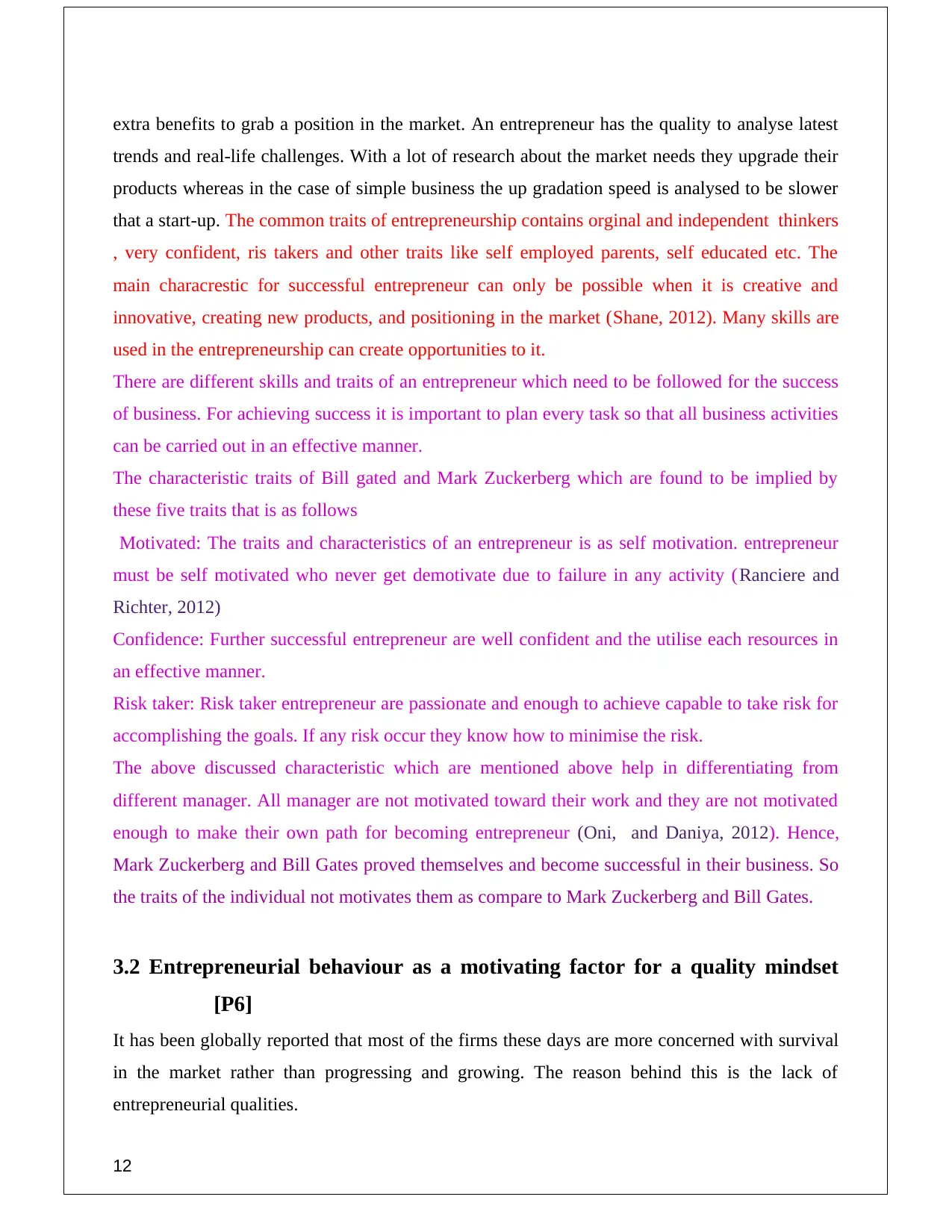
extra benefits to grab a position in the market. An entrepreneur has the quality to analyse latest
trends and real-life challenges. With a lot of research about the market needs they upgrade their
products whereas in the case of simple business the up gradation speed is analysed to be slower
that a start-up. The common traits of entrepreneurship contains orginal and independent thinkers
, very confident, ris takers and other traits like self employed parents, self educated etc. The
main characrestic for successful entrepreneur can only be possible when it is creative and
innovative, creating new products, and positioning in the market (Shane, 2012). Many skills are
used in the entrepreneurship can create opportunities to it.
There are different skills and traits of an entrepreneur which need to be followed for the success
of business. For achieving success it is important to plan every task so that all business activities
can be carried out in an effective manner.
The characteristic traits of Bill gated and Mark Zuckerberg which are found to be implied by
these five traits that is as follows
Motivated: The traits and characteristics of an entrepreneur is as self motivation. entrepreneur
must be self motivated who never get demotivate due to failure in any activity (Ranciere and
Richter, 2012)
Confidence: Further successful entrepreneur are well confident and the utilise each resources in
an effective manner.
Risk taker: Risk taker entrepreneur are passionate and enough to achieve capable to take risk for
accomplishing the goals. If any risk occur they know how to minimise the risk.
The above discussed characteristic which are mentioned above help in differentiating from
different manager. All manager are not motivated toward their work and they are not motivated
enough to make their own path for becoming entrepreneur (Oni, and Daniya, 2012). Hence,
Mark Zuckerberg and Bill Gates proved themselves and become successful in their business. So
the traits of the individual not motivates them as compare to Mark Zuckerberg and Bill Gates.
3.2 Entrepreneurial behaviour as a motivating factor for a quality mindset
[P6]
It has been globally reported that most of the firms these days are more concerned with survival
in the market rather than progressing and growing. The reason behind this is the lack of
entrepreneurial qualities.
12
trends and real-life challenges. With a lot of research about the market needs they upgrade their
products whereas in the case of simple business the up gradation speed is analysed to be slower
that a start-up. The common traits of entrepreneurship contains orginal and independent thinkers
, very confident, ris takers and other traits like self employed parents, self educated etc. The
main characrestic for successful entrepreneur can only be possible when it is creative and
innovative, creating new products, and positioning in the market (Shane, 2012). Many skills are
used in the entrepreneurship can create opportunities to it.
There are different skills and traits of an entrepreneur which need to be followed for the success
of business. For achieving success it is important to plan every task so that all business activities
can be carried out in an effective manner.
The characteristic traits of Bill gated and Mark Zuckerberg which are found to be implied by
these five traits that is as follows
Motivated: The traits and characteristics of an entrepreneur is as self motivation. entrepreneur
must be self motivated who never get demotivate due to failure in any activity (Ranciere and
Richter, 2012)
Confidence: Further successful entrepreneur are well confident and the utilise each resources in
an effective manner.
Risk taker: Risk taker entrepreneur are passionate and enough to achieve capable to take risk for
accomplishing the goals. If any risk occur they know how to minimise the risk.
The above discussed characteristic which are mentioned above help in differentiating from
different manager. All manager are not motivated toward their work and they are not motivated
enough to make their own path for becoming entrepreneur (Oni, and Daniya, 2012). Hence,
Mark Zuckerberg and Bill Gates proved themselves and become successful in their business. So
the traits of the individual not motivates them as compare to Mark Zuckerberg and Bill Gates.
3.2 Entrepreneurial behaviour as a motivating factor for a quality mindset
[P6]
It has been globally reported that most of the firms these days are more concerned with survival
in the market rather than progressing and growing. The reason behind this is the lack of
entrepreneurial qualities.
12
⊘ This is a preview!⊘
Do you want full access?
Subscribe today to unlock all pages.

Trusted by 1+ million students worldwide
1 out of 18
Related Documents
Your All-in-One AI-Powered Toolkit for Academic Success.
+13062052269
info@desklib.com
Available 24*7 on WhatsApp / Email
![[object Object]](/_next/static/media/star-bottom.7253800d.svg)
Unlock your academic potential
Copyright © 2020–2026 A2Z Services. All Rights Reserved. Developed and managed by ZUCOL.





